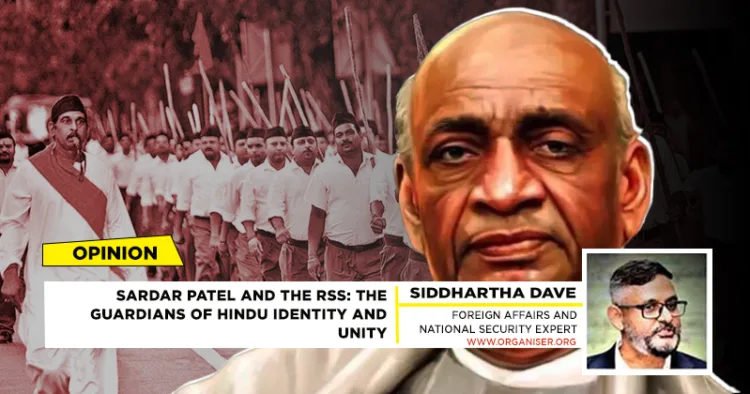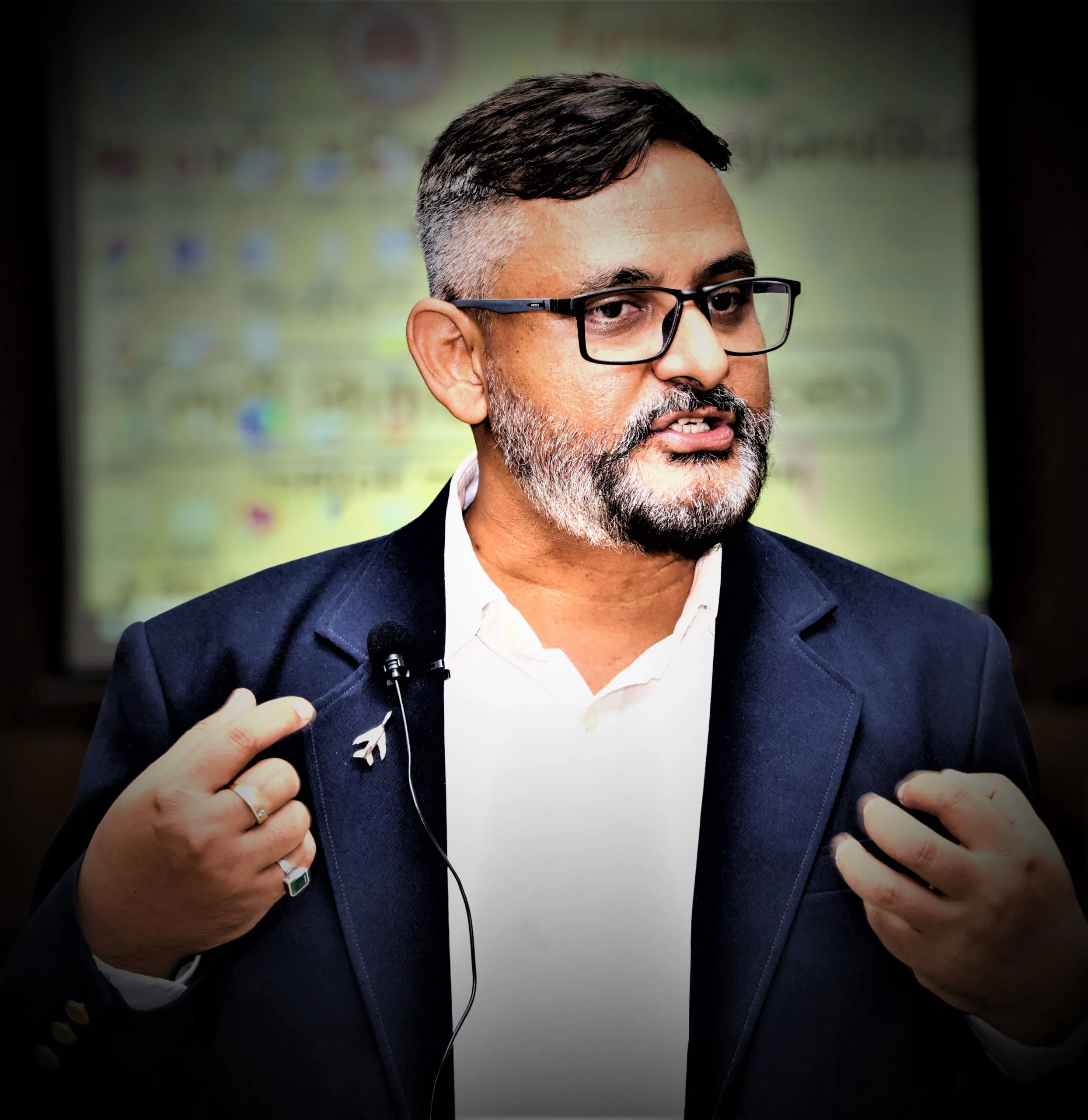As the birth anniversary of Sardar Vallabhbhai Patel approaches (October 31, National Unity Day or Rashtriya Ekta Diwas), it becomes crucial to reflect on his role in shaping modern Bharat and his relationship with the Rashtriya Swayamsevak Sangh (RSS), a key force in India’s socio-cultural landscape, working arduously since almost a century. While some sections of the political establishment, especially under Pt. Jawaharlal Nehru’s leadership, were apprehensive about the RSS, Sardar Patel’s approach was one of pragmatism and understanding. He recognized the positive role that the RSS played in nation-building and social service, especially during times of crisis.
Patel’s Initial Concerns: A Misunderstood Organisation
In the turbulent times following India’s Independence, the nation was grappling with communal tensions, political uncertainty, and the massive human tragedy of Partition. The RSS, as an organisation rooted in the cultural ethos of Bharat, stepped in to provide relief and assistance. However, in the aftermath of Mahatma Gandhi’s assassination on January 30, 1948, the RSS came under intense scrutiny. Misunderstandings about the organization’s intentions and activities led to accusations that it fostered an atmosphere of communal hatred.
Sardar Patel, as the Home Minister of India, had the unenviable task of maintaining peace and stability in the country. Initially, he imposed a ban on the RSS in the aftermath of Gandhi’s assassination, but he did so with a clear intention to investigate the truth. Patel was a man who believed in facts, not hearsay. After a thorough investigation, he concluded that the RSS as an organization had no part in the conspiracy to kill Gandhi. In his correspondence with the RSS leadership and other political figures, Patel expressed his belief that while certain individuals, who in past have been associated with the RSS may have acted in ways that were inappropriate, the organization itself had not been involved in any anti-national activity.
The Pragmatic Approach of Sardar Patel
Unlike Pt. Nehru, who harbored deep ideological differences with the RSS, Sardar Patel approached the situation with pragmatism and a deep understanding of the ground realities. He recognized the immense contribution of the RSS, especially in its efforts to serve the nation during the communal riots that followed ghastly Partition. The RSS had organized relief camps, protected vulnerable populations, and worked tirelessly to restore order and harmony in riot-affected areas.
Sardar Patel was also aware of the significant grassroots mobilization capacity of the RSS. He understood that the RSS was not just an organization with an ideological schema, but a cultural and social force that played an essential role in preserving Bharat’s civilizational values. In his letter to Shyama Prasad Mukherjee, Patel acknowledged that while he did not agree with every action of the RSS, he could not ignore its immense potential to contribute positively to the nation’s development.
A Turning Point: Lifting the Ban on the RSS
The ban on the RSS, imposed in 1948, was a matter of great debate within the government. Nehru and his left-leaning, communist friends wanted the ban to remain, viewing the organization as a potential threat to their nefarious plans for India. However, Patel, guided by his pragmatic approach, chose dialogue over confrontation. He engaged with the RSS leadership, including Guruji M.S. Golwalkar, and sought assurances that the organization would work within the framework of the Constitution.
In July 1949, after months of negotiations, the ban on the RSS was lifted. This was a significant moment in India’s political history. The RSS adopted a formal constitution. Patel saw this as a victory for reconciliation and unity, rather than division. By bringing the RSS into the mainstream, Patel ensured that its vast network of volunteers could contribute to nation-building in a constructive and positive manner.
The RSS’s Role in Nation-Building
Patel’s decision to lift the ban was not just a political move—it was a recognition of the constructive role the RSS had played in Indian society. From its inception in 1925, the RSS had worked towards the goal of fostering a sense of cultural unity and national pride among Hindus, while also promoting social service and self-discipline. During the Partition, the RSS played a vital role in protecting vulnerable populations, providing relief to displaced persons, and ensuring the safety of refugees.
In the years that followed, the RSS continued to expand its reach, engaging in various social welfare activities, promoting education, and helping rebuild communities. Patel, as a leader deeply committed to India’s unity, recognized the value of these efforts. He saw the RSS not as a divisive force, but as an organization that could help strengthen the social fabric of the nation.
Sardar Patel and Hindutva
Sardar Vallabhbhai Patel, the Iron Man of India, was not only instrumental in the unification of the nation but also had a nuanced understanding of the importance of Hindu identity. His candid discussions with Mahatma Gandhi reflected a deep awareness of the cultural and religious differences between Hindus and Muslims. He once expressed his concerns to Gandhi, stating, “The manners and customs of Muslims are different. They take meat while we are vegetarians. How are we to live with them in the same place?” This statement underscores Patel’s recognition of the challenges posed by communal differences and foreshadows his stance against appeasement.
In a letter to Rajendra Prasad on September 5, 1947, Patel, then the Home Minister, highlighted his proactive measures to arm Hindus for their protection. He mentioned having “already given licences to two or three Hindu dealers for the sale of arms.” This move was a clear indication of his commitment to safeguarding Hindu interests in the newly independent nation, illustrating his resolve to ensure that Hindus could defend themselves amidst rising communal tensions.
One of the most significant moments in Patel’s life was his visit to Junagadh shortly after Independence. The Nawab of Junagadh had expressed a desire to accede to Pakistan, and Patel’s decisive actions led to the Indian Army’s occupation of the state. During this visit, he was deeply moved by the dilapidated state of the Somnath temple, a symbol of India’s glorious Hindu heritage. VP Menon, one of Patel’s close associates, recounted Patel’s emotional response, stating, “He was visibly moved to find the temple which had once been the glory of India looking so dilapidated.” Patel declared that restoring the temple and its idols would be “a point of honour and sentiment with the Hindu public.” This initiative garnered strong support from the Sangh Parivar, emphasizing Patel’s alignment with Hindu sentiments, in stark contrast to Gandhi and Nehru, who disapproved of such overt expressions of Hindu identity.
In December 1947, Patel delivered a speech in Jaipur where he articulated his vision for harnessing the enthusiasm and discipline of the Rashtriya Swayamsevak Sangh (RSS). His acknowledgment of the RSS’s potential was a significant endorsement, positioning it as a force for national unity rather than division. Patel recognized the need for collaboration, extending an invitation for the Hindu Mahasabha to merge with the Congress and reaching out to RSS members. He criticized Nehru’s approach towards the RSS, stating, “In the Congress, those who are in power feel that by virtue of authority they will be able to crush the RSS. You cannot crush an organization by using the danda [stick]. The danda is meant for thieves and dacoits. They are patriots who love their country. Only their trend of thought is diverted. They are to be won over by Congressmen with love.”
Patel’s actions reflected a pragmatic approach to nationalism, as he legalized the RSS after it adopted a constitution meeting his requirements. He envisioned reforming the Congress from within, allowing RSS members to contribute positively to the national discourse. On October 10, 1949, while Nehru was abroad, Patel facilitated a resolution that permitted RSS members to participate in the Congress party, a decision that Nehru later nullified, illustrating the ideological rift within the leadership.
Through these instances, Sardar Patel emerges as a proponent of Hindu identity, advocating for unity and strength in the face of communal challenges. His emphasis on restoring the Somnath temple, his proactive measures for Hindu self-defense, and his efforts to collaborate with the RSS highlight his deep commitment to Hindu values and his belief in their crucial role in nation-building. In contrast, the hesitations and reservations exhibited by Gandhi and Nehru regarding Hindu identity reveal their misalignment with the sentiments of a significant portion of the Indian populace. Sardar Patel’s legacy as a champion of Hindu unity and pride remains an inspiring beacon for those who advocate for a strong, inclusive, and Hindu-centric India
Patel’s Legacy and the RSS Today
Today, as the RSS continues to play a significant role in shaping Bharat’s social and political landscape, Sardar Patel’s legacy looms large. His decision to lift the ban on the RSS, despite opposition from within his own party, was a testament to his belief in the power of dialogue and reconciliation. Patel understood that the RSS, far from being a threat to India’s unity, was a force that could contribute positively to the nation’s development.
The RSS’s continued focus on social service, education, and nation-building activities reflects Patel’s vision of an organization that works in the interest of the nation. From its work in disaster relief to its promotion of indigenous industries, the RSS has consistently demonstrated its commitment to the idea of a strong, self-reliant India.
A Legacy of Unity and National Service
Sardar Vallabhbhai Patel’s relationship with the RSS is a story of pragmatism, understanding, and national service. While others sought to marginalize the organization, Patel recognized its potential to contribute positively to India’s social and cultural fabric. His decision to lift the ban on the RSS was not just a political act, but a reflection of his deep commitment to national unity and reconciliation.
As we remember Sardar Patel on his birth anniversary, we must acknowledge his vision for a united India—one that included all sections of society, including the RSS. His legacy serves as a reminder that true leadership lies in bringing people together, fostering dialogue, and working towards the common goal of nation-building. Patel’s belief in the power of the RSS to contribute to Bharat’s growth remains as relevant today as it was in his time.




















Comments